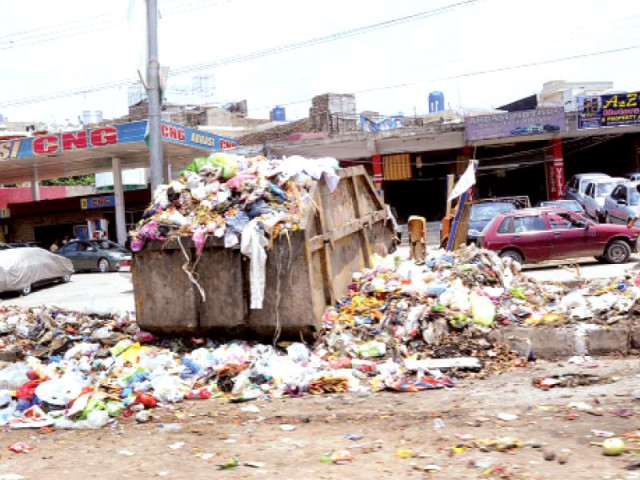Fighting dengue: With all that garbage lying around, anti-dengue fumigation drives don’t help
Expert says breeding sites must be eliminated.

Monsoon and dengue seasons are around the corner but the twin cities’ administrations, despite making tall claims, have yet to set up a solid waste management system.
Pre-monsoon rain has already started in Islamabad and Rawalpindi due to which heaps of garbage in the majority of areas in the twin cities such as Satellite Town, Pirwadhai, IJ Principal Road, sectors I-9, I-10, G-11, has been awash with rainwater, providing favourable breeding grounds for mosquitoes.
“Dengue mosquito is found in a domestic environment and mostly it looks for trash such as empty bottles, shopping bags, egg shells, broken pots or accumulated rainwater near homes to breed,” said Dr Rana Muhammad Safdar, principal epidemiologist at the National Institute of Health (NIH).
In Pakistan, dengue fever seasons starts in July, coinciding with the start of the monsoon, so extra precautionary measures need to be taken, he stated.
“It is a misconception that fogging and fumigation are the best preventive measure against dengue mosquitoes. It is only done to satisfy people that the authorities take these steps,” he said. “One infected person or dengue mosquito in the community poses a big threat to all.”
He expressed concern over the number of dengue fever cases being reported from across the country. So far, 100 cases have been reported from Sindh alone, four to five from Khyber-Pakhtunkhwa and one from Punjab.
A female infected dengue mosquito usually looks for breeding grounds in populated areas and the eggs she lays produce infected mosquitoes.
“It is important to clear all the garbage in residential or commercial areas to prevent dengue fever outbreak,” he said.
Speaking to The Express Tribune, an official in the Islamabad Capital Territory (ICT) administration on the condition of anonymity said the situation is worse in the suburbs of the capital where there is garbage lying all around. While funds are usually allocated for the purpose, they are not released.
“Every year, the majority of dengue fever cases are reported from rural ICT but except fogging or fumigation no other measures are taken by officials to control its spread,” he said.
Islamabad Chief Commissioner Jawad Paul was unavailable for a comment.
Meanwhile, an official in the health department Rawalpindi district said last month in May an agreement was signed between Turkish company Albayrak and Rawalpindi Waste Management Company in Islamabad. “All eyes are on this project to clean up Rawalpindi.”
Published in The Express Tribune, June 29th, 2014.



















COMMENTS
Comments are moderated and generally will be posted if they are on-topic and not abusive.
For more information, please see our Comments FAQ